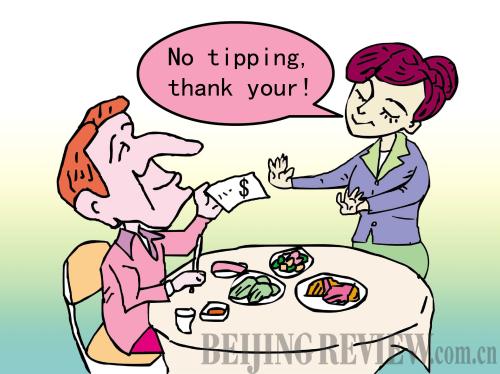|
 |
|
(LI SHIGONG) |
My arrival here in July marked a symbolic one—that of a tired, yet true emissary from a drifting America to a newly empowered People's Republic of China. My move emanated from a great job offer, of course, and, to a lesser degree, a lack of ways to make a decent living given the economic cauldron bubbling over back home.
But in the few months I have spent here, the world's most populous country has taught me an unexpected thing or two about money: how to handle it, how to respect it—and, perhaps most importantly, a new meaning of pride, humility and honesty in a society where the belief system known as Confucianism thrives like no other.
It took me but a few days to figure out how much renminbi one can buy with a U.S. dollar. It took fewer to understand that—depending on one's circumstances and, of course, nationality—one can also refer to it as "kuai" or "yuan," and that the Chinese etiquette when it comes to simple, everyday affairs and dynamics of money itself are something to be admired.
To the untrained eye, the ability of Chinese to handle money can be nothing short of awe-inspiring. This dexterity and intense accuracy is apparent to anyone with any dealings with Chinese merchants, taxi drivers and—obviously—bankers alike.
They flit through fistfuls of yuan with the greatest of concentration, yet the greatest of ease. The function itself can appear robotic, but there is also something very natural, almost organic about it—and, at times, otherworldly.
In most stores and restaurants in much of the West, where bills are tightly relegated to proper denominations in cash registers. Here however, Chinese merchants can often be seen sifting through their cash loosely splayed in drawers under their merchandise.
Of course, it is next to impossible to imagine an American store clerk, for example, grabbing through a box littered with dollar bills in different denominations to provide change to busy customers. In China, merchants, waiters and others in the service sector, however, fish through the fistfuls of yuan as if with a sixth sense, without care, knowing exactly how much money they are scooping up into their hands—before counting it meticulously.
To an outsider with no bank telling experience, it is a spectacle that can leave one feeling helpless. Like a young child, lost in a supermarket.
Clearly, money matters in China also extend far beyond simply counting and returning change. For one thing, there often can be an irreplaceable grace when one is offered change after a purchase—specifically, the way many merchants return bills face up, smiling, with both hands.
There's more, naturally. As most on the mainland know, tipping is generally not the norm. Attempts to offer one, most often, will often be politely—even robustly—rebuffed. In countries like the United States, on the other hand, failure to do so is no less than heresy—the sign of a miser, a cheapskate; in ways, a maddeningly lesser form of humanity.
But the custom of tipping also offers a perspective into to how countries like America function.
Naturally, a waiter or waitress in an American restaurant will receive a tip commensurate with service and the amount of food ordered after a meal. On a basic level, this ensures the timely arrival of a meal of decent quality. This also holds true for bartenders, taxi drivers and hotel staff—among many other professions.
Overall, these gratuities contribute to a greater good: As money changes hands, it creates employment and, to a significant degree, nourishes the U.S. economy. Indeed, it is a given that in most restaurant jobs, for instance, hourly pay is often very low—with tips expected to make up the difference.
Steeped in China's rich history and culture is a belief in the need for a collective harmony often—for better or for worse—over that of the individual. This, in addition to millennial cultural norms that encourage saving over to spending, has helped fuel China's spectacular growth.
Thus it has become the pride of providing the service itself that has transcended the need for gratuities or tips themselves: Whether it is the number on the taxi meter, or the digits scrawled on a restaurant bill, payment is mandated as always—but not a single yuan more, nor a single kuai less.
My most astonishing instance involving money took place not long after checking into a hotel during a two-day visit to Shanghai in October. It was there that I had left my debit card at the front desk as a deposit for the night.
The next morning, I had long left the hotel and was on my way to a subway station when a man who had randomly accompanied me from the hotel received a call: I had left my card back at the front desk.
On my return, a young hotel employee approached and presented me with a sealed envelope, cradled toward me, with both hands extended. But before placing it in mine, she gingerly opened it, revealing my blue plastic card. Noticing my puzzled expression, her warm smile melted away as she cupped it with her hand, giggled and turned away, with just a hint of embarrassment.
In the months since, I have tried to conceive of any other place where such a scenario could have taken place.
But I haven't—and I doubt I could.
The writer is an American living in Beijing | 